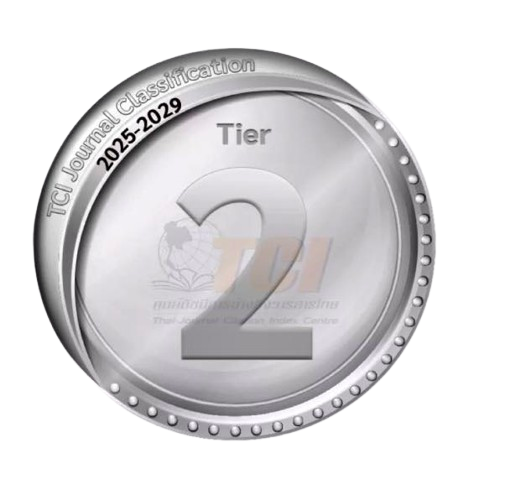Effects of TEDA4I Program on Children 0-5 Years with Delayed Development in Lamphun Hospital
Keywords:
TEDA4I Program, Children 0-5 Years Old, Developmental DelayAbstract
Background: The TEDA4I program in children aged 0-5 is an assessment tool to help early childhood children with developmental problems.
Objective: To study the effects of the TEDA4I program in children aged 0-5 years with developmental delay. And analyzed factors correlated with the outcome of the TEDA4I program in children 0-5 years of age with developmental delays in Lamphun Hospital.
Study design: It's a quasi-experimental research. The sample was 0-5 years of age children who were screened with DSPM and DAIM with suspected developmental delay and were stimulated with TEDA4I for 3 months, totaling 92 people. The tool used to collect data is a pattern of developmental behavior developed from the TEDA4I program. Analyze data with descriptive statistics including frequency, percentage, averages, and standard deviations. And inferential statistics include Fisher's exact test and Chi-square test.
Results: Children 0-5 years old with developmental delay after receiving developmental stimulation with the TEDA4I program, overall improvements have been made. 59.8% It improved the most in receptive language, 87.0%, followed by personal and social skills 82.6%, expressive language 79.3%, fine motor skills 65.2% and gross motor skills minimal improvement 55.4%. In addition, it was found that children of different ages improved their receptive language, expressive language and personal and social skills to a statistically significant age difference of 0.05. Children aged 37-48 months and 49-60 months of age have improved their receptive language, expressive language and personal and social skills 100.0%
Conclusions: The TEDA4I program improves children by 59.8% and different age ranges affect the development of receptive language, expressive language and personal and social skills.
Keywords: TEDA4I Program, Children 0-5 Years Old, Developmental Delay
References
กรมสุขภาพจิต. ผลการใช้โปรแกรม TEDA4I ในเด็กบกพร่องทางพัฒนาการสติปัญญา สถาบันราชานุกูล. กรุงเทพฯ: สถาบันราชานุกูล กรมสุขภาพจิต; 2562.
หนึ่งฤทัย เกื้อเอียด. สถานการณ์และปัจจัยที่มีความสัมพันธ์ต่อพัฒนาการเด็กไทยอายุต่ำกว่า 5 ปี. วารสารเครือข่ายวิทยาลัย พยาบาลและการสาธารณสุขภาคใต้ 2560;5(1):281-96.
กระทรวงสาธารณสุข. คู่มือเฝ้าระวังและส่งเสริมพัฒนาการเด็กปฐมวัย. กรุงเทพฯ: สำนักงานกิจการโรงพิมพ์องค์การสงเคราะห์ทหารผ่านศึก; 2562.
นพวรรณ ศรีวงค์พานิช. การส่งเสริมพัฒนาการ. กรุงเทพฯ: บียอนด์ เอ็นเทอร์ไพรซ์; 2556.
กรมสุขภาพจิต. คู่มือการประเมินเพื่อช่วยเหลือเด็กปฐมวัยที่มีปัญหาพัฒนาการ. กรุงเทพฯ: กรมสุขภาพจิต กระทรวงสาธารณสุข; 2558.
นิรมัย คุ้มรักษา, รัชดาวรรณ์ แดงสุข, ธัญหทัย จันทะโยธา. ผลของโปรแกรม TEDA4I ในเด็กที่มีปัญหาพัฒนาการในจังหวัดกาญจนบุรี. วารสารราชานุกูล 2561;33(1):19-29.
เอกชัย ลีลาวงศ์กิจ. 2563. ผลของการใช้เครื่องมือ TEDA4I ในเด็ก 0-5 ปี ที่มีพัฒนาการล่าช้า จังหวัดอุดรธานี. วารสารการแพทย์โรงพยาบาลอุดรธานี 2563;28(1):101-11.
ชฎาภรณ์ ชื่นตา, สุภาพร แก้วใส, สมจิต แซ่ลิ้ม, เพียงนคร คำผา. การพัฒนาการเฝ้าระวังและส่งเสริมพัฒนาการเด็กปฐมวัยแบบบูรณาการ ในศูนย์พัฒนาเด็กเล็ก จังหวัดยโสธร. ยโสธร: รายงานการวิจัย สำนักงานสาธารณสุขจังหวัดยโสธร; 2561.
เยาวรัตน์ รัตน์นันต์. การศึกษาปัจจัยที่มีผลต่อพัฒนาการเด็กปฐมวัยไทย เขตสุขภาพที่ 8. อุดรธานี: เขตสุขภาพที่ 8; 2560.




